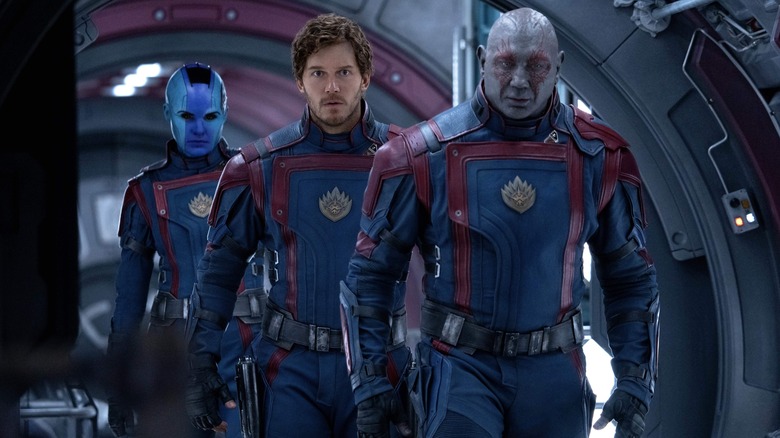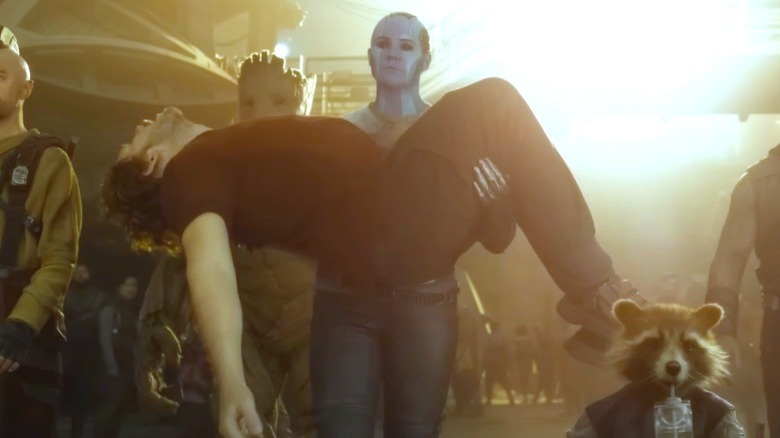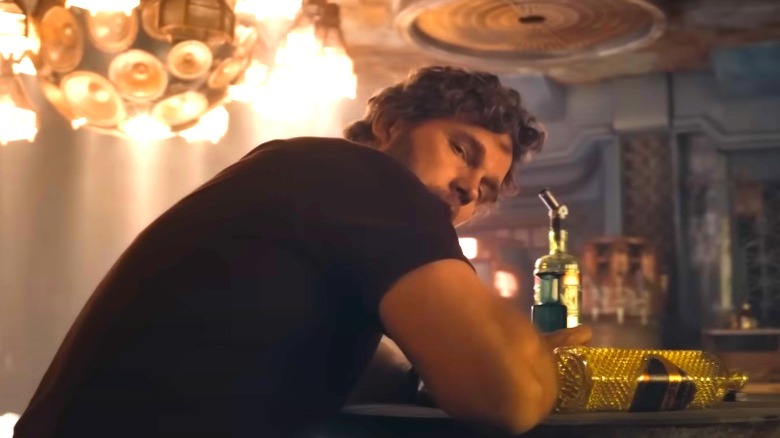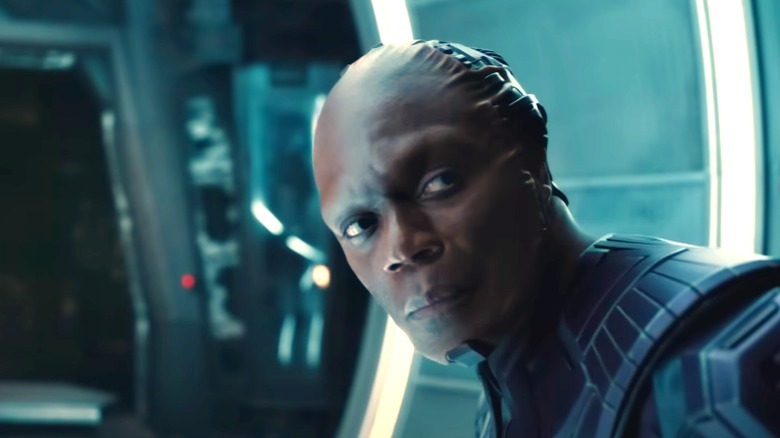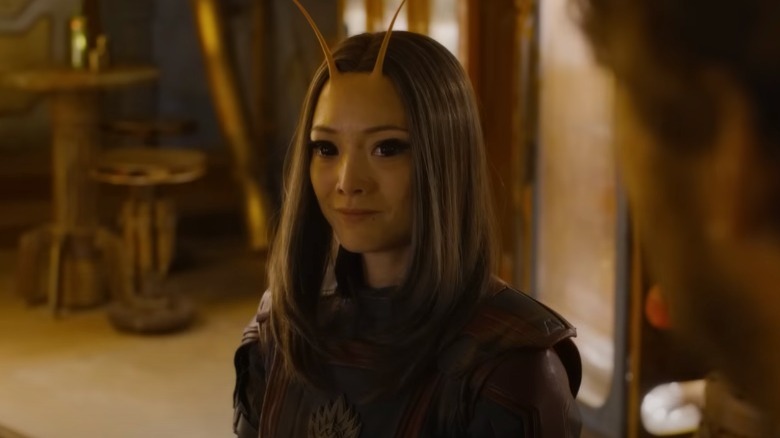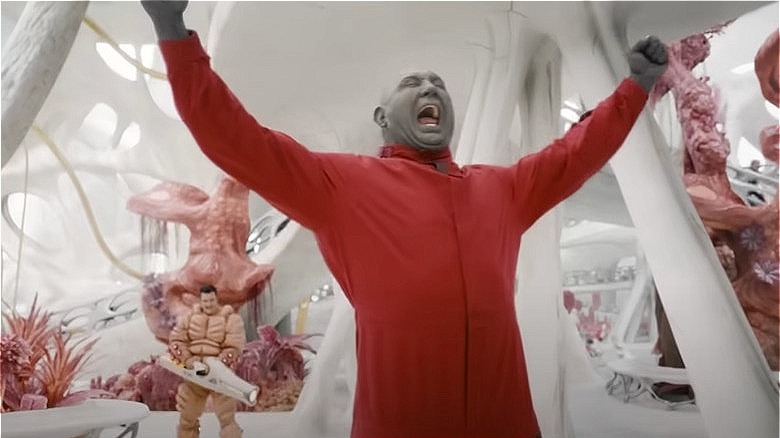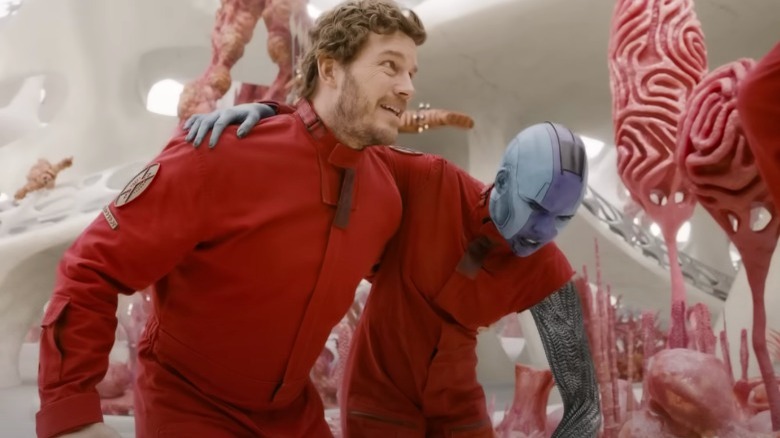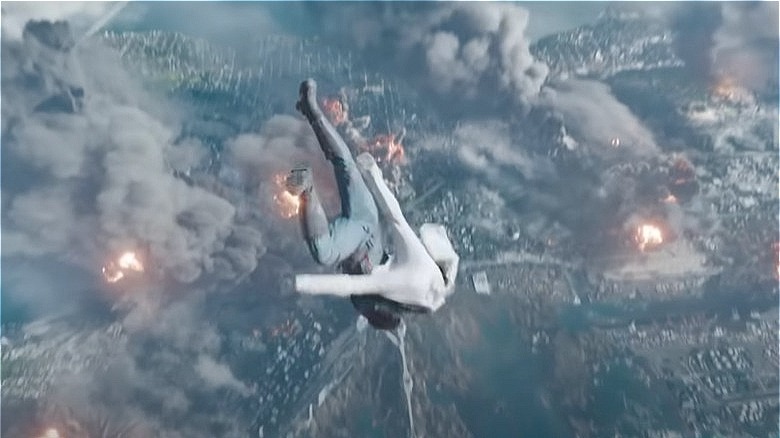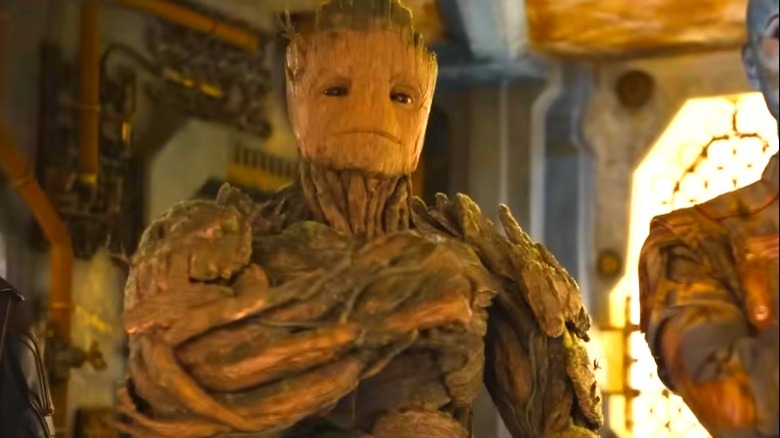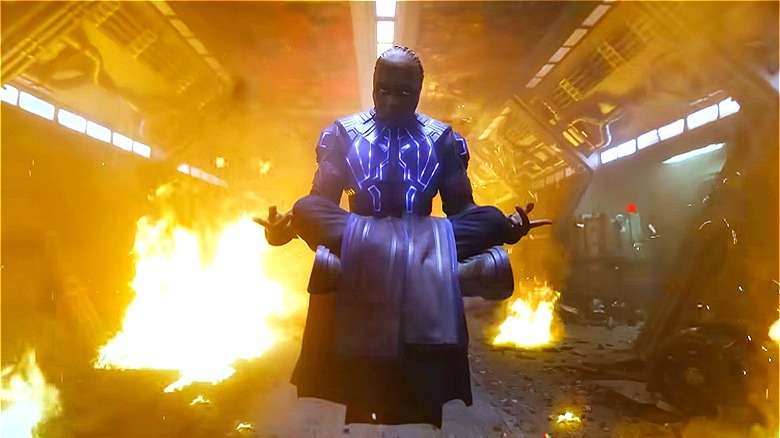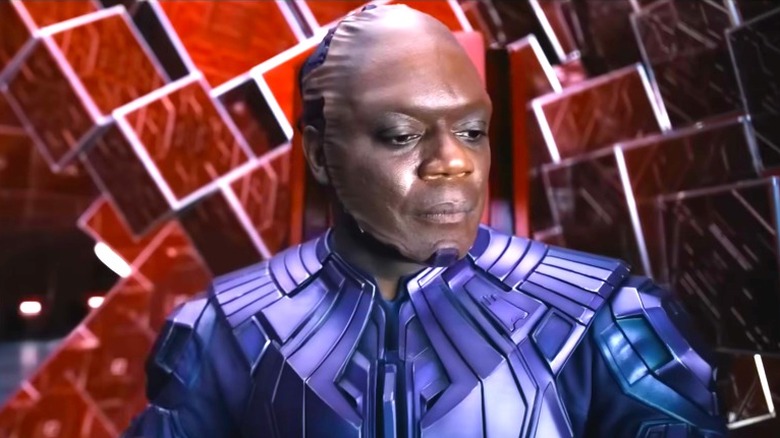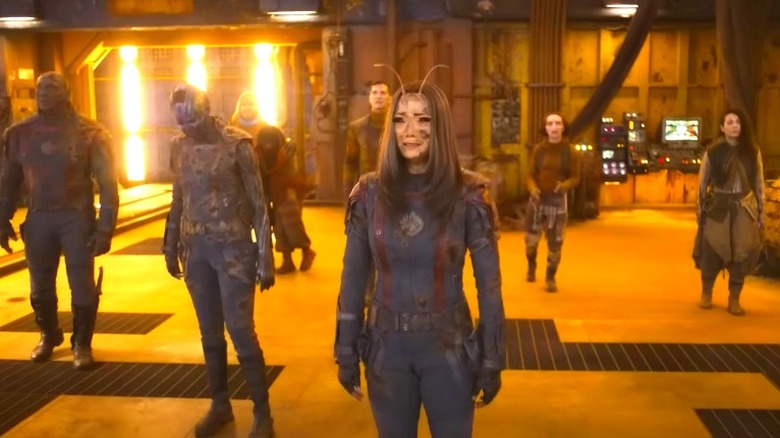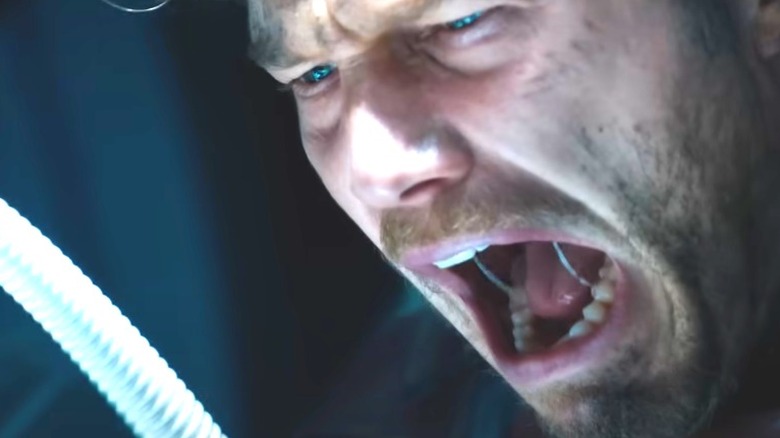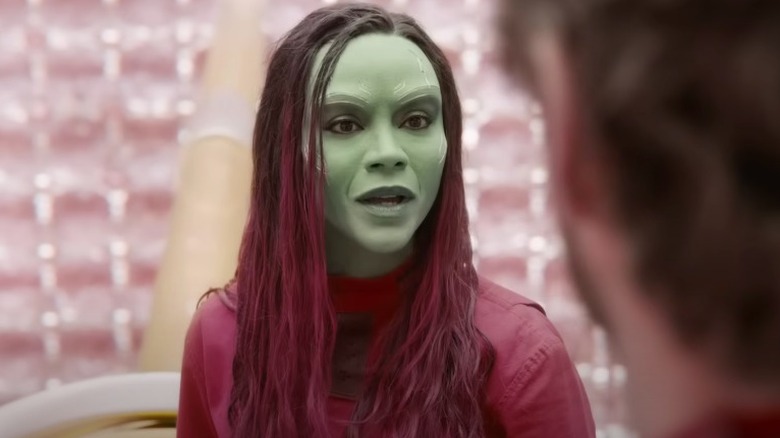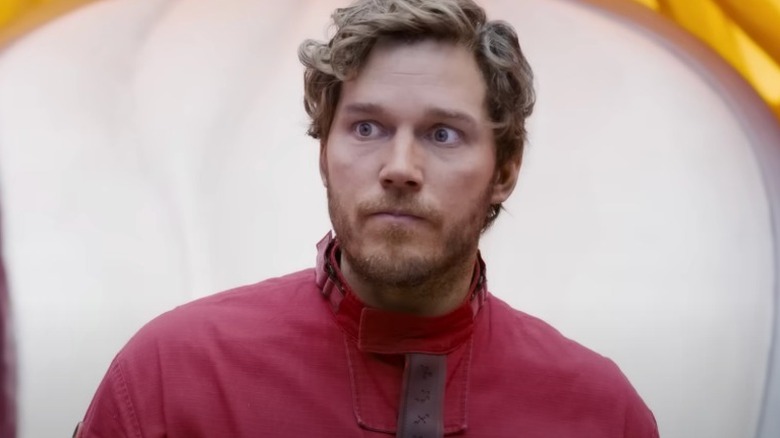Things Only Adults Would Notice In Guardians Of The Galaxy Vol. 3
Contains spoilers for "Guardians of the Galaxy Vol. 3"
After six years and many fictional deaths, the Guardians of the Galaxy are back. "Guardians of the Galaxy Vol. 3" is the long-awaited finale to the Guardians' solo films, concluding the space adventures of the gang we know and love.
This film is a much more serious departure from the typically lighthearted tone of the "Guardians of the Galaxy" franchise. Rather than focusing on Peter Quill (Chris Pratt) and his past, it centers around Rocket (Bradley Cooper) and his tortured upbringing. The Guardians have to figure out how to save Rocket, whose programmed kill switch is getting ready to be activated, and take down one of the most cold-hearted villains in the franchise.
As is only appropriate for the trilogy's finale, "Guardians of the Galaxy Vol. 3" features each of the members of the Guardians finding a way to move forward with their lives. However, the door is not shut for them to return to the Marvel Cinematic Universe — especially Star-Lord, who is certain to return based on the end credit scene of the film.
Another familiar aspect of this movie, though, is the use of adult jokes and themes that many of the younger viewers might miss. Read on for the parts of "Guardians of the Galaxy Vol. 3" that only adults would notice.
Peter's Alcoholism
The film's opener is extremely somber, with the use of an acoustic version of Radiohead's "Creep" to show that there is more than a touch of melancholy in the group. However, one of the clear problems in the beginning — which the audience quickly realizes will be a theme throughout the film — is Peter dealing with the loss of his relationship with Gamora (Zoe Saldana) by getting drunk out of his mind, requiring Nebula (Karen Gillan) to carry him to his bed.
As Nebula carries him, Drax (Dave Bautista) looks at her and asks, "Again?" This indicates that Peter has been getting drunk a lot while crying over Gamora. In Peter's drunken haze, he even calls Nebula "Gamora," telling her he loves her. The scene is devastating, showing that Peter is not even a little bit close to healing from the loss of his girlfriend.
The fact that Peter turns to alcohol, frequently, is a destructive coping mechanism for his pain. Though younger viewers might see this and think that his drunken antics are comical, older viewers have a deeper understanding of how much of a sad and stressful situation this is for Peter and his friends. Fortunately, he figures it out and gets back on track over the course of the film, but the opening scene is a dark example of coping with loss.
Touch him and make him happy
Mantis' powers of persuasion are only somewhat explored in this film. There are a few moments where her powers could have come in handy, including the opening scene where Peter is struggling with his feelings for Gamora. She could have helped him feel happier with her powers, but instead decided it would be good for him to heal on his own, knowing that any relief she could offer him would only touch the surface of his pain and not be helpful in the long run.
The joke here, though, comes from the verbiage of the situation. The fellow Guardians question Mantis' role in Peter's feeling better, asking why she will not "touch him and make him happy." The line is immediately taken in the wrong way — touching him in an inappropriate sense, that is — and the Guardians make no effort to let the sexual double entendre go.
High Evolutionary's step stool
This film explores in detail the intense villainy of the High Evolutionary (Chukwudi Iwuji), who is one of the least redeemable bad guys we have seen from Marvel in a while. Instead of finding some way for the audience to empathize with his backstory or see the good in him, we can all agree that between his torture of animals, horrible treatment of Rocket, and murder of Rocket's friends, we wanted this guy out of the picture.
He is not a complicated character in that he just wants two things: One, to create the "perfect" species to fix everything that is wrong with Earth, and two, to be the most worshiped creator of that species. The extremes of his ego become abundantly clear when he first interacts with Ayesha (Elizabeth Debicki), the leader of the Sovereign. Because Ayesha is powerful and tall, High Evolutionary feels he needs to find a way to assert his dominance over her. He has his assistant bring out a step stool and he stands on it to seem taller than — or at least at eye level with — Ayesha. Though most of the audience would get this, the deeper meaning comes from the control he feels he should have in the situation, and that he needs to be the more powerful one by seeming physically bigger to Ayesha.
Dying at age 50
In the film, Quill and Mantis begin talking about the length of lives on Earth. But since Quill left the planet when he was a little boy, he doesn't exactly have a solid grasp on how long humans live. He makes the comical assumption that adults die at the age of 50 on Earth, which in and of itself is ludicrous — Mantis is horrified and bewildered, questioning the point of even living with such a short lifespan.
For Mantis and the other alien creatures, they are not confined by human life expectancy. For example, where Star-Lord is in his mid-30s to early 40s throughout the "Guardians of the Galaxy" films, Drax sits at about 1500 years old. This is why the idea of living such a short life on Earth is so confusing, even prompting Mantis to ask "What's the point of being born?" To adults, life seems long and fulfilling on Earth, which makes it funny to watch Mantis try and grapple with the notion that the average U.S. life expectancy is in the late 70s instead of living for thousands of years like some creatures. The film also lands the additional punchline of having the Guardians unable to gauge how old Quill is, assuming that he's near the end of his life.
Nepotism and lunacy
One of the best parts of the film comes from a cameo by Nathan Fillion, who plays one of the guards trying to impede the guardians from getting Rocket's file. Fillion performs the role with great humor, as expected, but has one particular scene that stands out. When the Guardians are trying to get past Fillion and his lackeys, they pretend to be working on the ship, too. This confuses the guards enough to believe it is true, especially when Drax starts getting in on the act and almost ruins it with his fake anger.
Quill thinks quickly on his feet and passes Drax off as an incompetent employee who only received the job because of nepotism, claiming that he's the boss's nephew — code everywhere for someone comically ill-equipped for a position but who has all the right connections. Fillion's character commiserates with Quill saying that he has a guy like that on his team too. The nepotism humor would likely go over children's heads, but will definitely land with adults.
Counter-Earth car snatch
When we think of the stereotype of suburban American dads, one of the first images that comes to mind is a man borderline obsessed with his car. That's the case on Counter-Earth as well.
When Peter and the Guardians seek help from a nice family on Counter-Earth, they discover that the mother is willing to help them, while the father is nervous and clueless about the situation. This stereotype is further perpetuated when Peter asks the mother to borrow the family car. The mother is fine with it, understanding how dire their situation is, but the father gives an exasperated look and frustrated body language that indicates that he cares a lot about the car and does not want these otherworldly beings driving it. It's a minor detail that requires an adult understanding of societal stereotypes, and it makes for a nice quick laugh before the Guardians head straight into danger.
Drug deals on Counter-Earth
One of the most ironic adult jokes comes in a flash while the Guardians are on Counter-Earth. As the Guardians are driving to the High Evolutionary's ship to confront him, they pass by many different residents of the planet. In one quick scene, the Guardians see some of the residents doing a back alley drug deal. It's over in a flash, but you can see them looking around as if they are about to be caught and it's obvious to older audiences what this interaction is supposed to represent.
This scene reflects the irony of the High Evolutionary's mission. He wanted to create a version of Earth without all of the negativity and weaknesses of humanity that he feels are inherent to the planet. However, even on Counter-Earth, you still see the residents participating in taboo activities, such as buying and selling drugs, making the High Evolutionary's efforts ultimately in pursuit of a lost cause.
I am Groot, Suck My -
It is common knowledge among Guardians fans that the only people who can understand what Groot is talking about when he says his famous three words — "I am Groot" — are the Guardians themselves. At first, Gamora doesn't understand what Groot is saying. However, by the end of the film, Gamora realizes that she can understand Groot now after spending so much time with him. The rules of understanding Groot's language are not always made clear to the audience, but we don't need to think about it too much, because the Guardians always end up translating what he says.
One part of the film shows Peter translating Groot's speech to the villains, where Groot says, "I am Groot," and Peter translates that to "Suck my -–" before being cut off for comedic effect. The adults in the audience will know that there are several words he could've used to end that phrase, all of which involve coarse language. Obviously, he did not get to finish the sentence, leaving it up to the audience's imagination. Either way, younger audiences might not understand what that phrase is supposed to mean, but adults definitely will.
High Evolutionary or purple nurple
Another blink-and-you'll-miss-it joke from the film comes from Peter's nickname for the High Evolutionary. When Peter is trying to seem tough against the High Evolutionary, he calls him several names to mock him. In true Star-Lord fashion, he is anything but mature when facing off against this villain. However, one nickname that particularly stands out is "Purple Nurple," which Peter calls him because of his purple color scheme and wrinkled facial skin.
A purple nurple is an old prank that most adults will know as taking a person's nipple between your thumb and pointer finger and twisting it roughly with the intent of irritating and causing pain to your victim. Purple nurples aren't as widespread among the youth of today, so it is more geared toward the adults in the room. Either way, the fact that Peter looked this villain in the face and called him a literal purple nurple might be one of the funniest interactions we have seen between Star-Lord and a villain.
Face-off, both metaphorical and literal
When Peter attempts to explain to his fellow Guardians that he knows he is walking into a trap with the High Evolutionary, he specifically refers to the interaction as a face-off. When he says this, it means that he is going to go up against the High Evolutionary directly and not back down until he can figure out how to save Rocket. The Guardians feel that he is being naïve to walk into a trap, but Peter thinks he can take the High Evolutionary.
However, this verbiage became a distinct form of foreshadowing. Later in the film, when the Guardians actually do get to face off against the High Evolutionary, Gamora literally rips his face off, revealing the scars and bloody mess that Rocket left after attacking him to escape. Adults might pick up quickly that because the High Evolutionary has a mask on, Peter's face-off comment would be relevant later. However, the fact that the scene was both a literal and metaphorical face-off made the payoff all the better.
Parallels to child abuse
After Nebula, Drax, and Mantis get stuck on the High Evolutionary's ship trying to save Peter and Groot, they are startled to find hundreds of creatures locked on the ship with no way out. In particular, they are mortified to see so many children, trapped in cages. Eventually, the Guardians make the decision to save all of the children and bring them back to their floating planet, but it's very clear to older audiences that this is a representation of both human trafficking and children that are kept in federal immigration custody.
Part of a completely new species that the High Evolutionary created, these children are being trained to settle on the new Earth the High Evolutionary wishes to build. However, by keeping kids in cages, it seems indicative of a large social issue that plagues the U.S., which is the treatment of immigrant children, and the epidemic of human trafficking around the world. The scene will likely hit adult viewers right in the gut, leaving them uneasy until the Guardians safely evacuate the children from the ship. It is a devastating parallel, but one that is quite relevant at the moment.
Death without rules
The Guardians' key mission throughout the whole film is to save Rocket. They finally gain access to the passcode that will prevent Rocket from dying, but they have to race against time to program it into Rocket's body before he dies. While they are trying to save him, Rocket has a brush with death. He goes toward an ethereal-looking white light and sees his friends that he made while being held captive and tortured. They all tell him how much they miss him, and how much they want him to be with them. However, they tell him it isn't his time yet and send him back to be with the Guardians.
This brush with death is very interesting because they show Rocket nearing the end without putting any sort of religious connotation on the experience. There is no telling if that was an illusion Rocket was having as he was dying, or if there really is an afterlife. Adults will recognize the fact that this makes the scene appeal to a wider audience, not reflecting any one specific belief system.
Growing out of a relationship
One of the big themes throughout the film came from Gamora and Peter's relationship — specifically, the process of growing out of a relationship, and realizing when something isn't the same as it used to be. Throughout the film, Peter works hard to convince Gamora of who she used to be, and how they were in love. However, what Peter fails to understand about Gamora is that she's a different person now, and not the woman he fell in love with. By his logic, he is denying who she is now, just as she is denying who they used to be.
Not putting Peter and Gamora together at the end of the film was smart. Though they were a great couple at one time, it's clear they both need different things. It's likely that only adults will understand the tough sting of the scene between Peter and Gamora where, after all of the time she spent deriding the legitimacy of their relationship, she acknowledges it to Peter by saying "I bet we were fun." This little moment validates Peter's feelings, while also showing that the two of them have grown out of their relationship with one another. Though the option to reunite is not necessarily completely off the table, they're definitely done for now. It teaches a great lesson that people need to be able to accept one another for who they are, and allow people to grow rather than keep them in a box.
Finally choosing yourself
Another big theme that adults will likely understand in more depth than younger audiences has to do with choosing yourself. At the end of the film, all of the Guardians find what they most need in their lives to be happy. But Mantis and Peter are the two Guardians who truly choose themselves, making the tough choice to go out on their own and find what makes them happy. For Peter, that means going back to Earth to reunite with his grandfather. For Mantis, it's less specific. She has never had a chance to find her own identity. She went from working with Ego to being a key member of the Guardians of the Galaxy, but has never simply been Mantis. Now, both Peter and Mantis have a chance to see what their lives would be like outside of the Guardians.
Adults can understand how difficult it can be to choose yourself. There are many scenarios in which people feel they need to put others first, but the truth is that sometimes you have to make a decision with your own happiness in mind. This theme is heavy, and some younger audiences might not understand why the Guardians decided to split up, but it was necessary for them to continue to grow.
